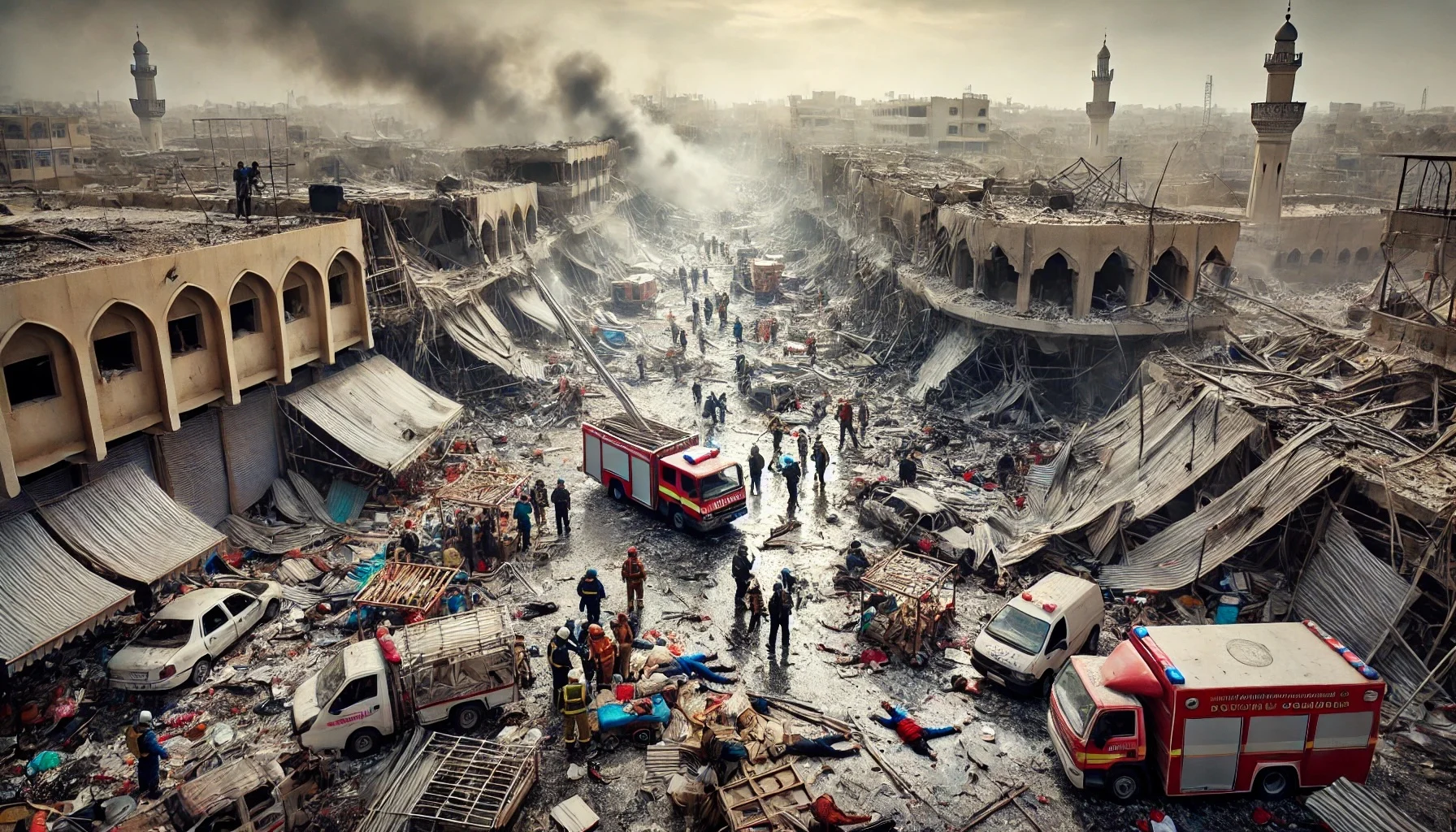
The 2015 Baghdad Truck Bombing
by: The Calamity Calendar Team
August 13, 2015
The bustling streets of Baghdad’s Jameela Market were a sight to behold on the morning of August 13, 2015. Vendors were busy setting up their stalls, and early morning shoppers were already weaving through the aisles, seeking fresh produce and household essentials. In the midst of this everyday hustle and bustle, a grim plot was unfolding.
As the first light of dawn broke over Sadr City, a densely populated district in Baghdad, a seemingly innocuous refrigerated truck made its way through the crowded streets toward Jameela Market. The driver maneuvered skillfully through the morning traffic, positioning the vehicle strategically at the heart of the bustling market. Unbeknownst to the vendors and shoppers around, the truck was loaded with explosives, a deadly payload that would soon transform the market into a scene of chaos and carnage.
The Explosion
At precisely the wrong moment, the explosives detonated with a thunderous roar, sending a shockwave through the market. The force of the blast was tremendous, instantly tearing through stalls and shops, hurling debris high into the air, and leaving a massive crater in its wake. Those who survived the initial blast found themselves in a nightmarish landscape of destruction, with fires raging and thick plumes of smoke obscuring the morning sun.
The market, once vibrant and full of life, was now a scene of horror and confusion. Survivors, many injured and disoriented, stumbled through the wreckage, searching desperately for loved ones and trying to aid the injured. Emergency services arrived swiftly, but the scale of the devastation posed an immense challenge. Rescue workers battled through the debris, pulling survivors from the rubble and rushing them to overwhelmed hospitals across Baghdad.
The Human Toll
Thanks for subscribing!
The human cost of the bombing was staggering. At least 76 people lost their lives, and 212 others were injured, making it one of the deadliest attacks in Baghdad that year. The blast not only claimed lives but also shattered the livelihoods of countless vendors whose stalls and goods were obliterated. The economic impact rippled through the community, exacerbating the region’s already precarious economic situation.
A City in Mourning
As the city reeled from the attack, Baghdad and the broader international community condemned the atrocity. The Iraqi government quickly attributed the bombing to the Islamic State of Iraq and Syria (ISIS), a Sunni extremist group that had been orchestrating a campaign of terror across the region. For ISIS, targeting the Shia-majority area of Sadr City was a calculated move, intended to incite sectarian violence and undermine government authority.
Government Response and Recovery Efforts
In the wake of the bombing, the Iraqi government faced the daunting task of responding to the crisis. Security forces were deployed to secure the area and prevent further attacks, while hospitals issued urgent appeals for blood donations and medical supplies to treat the influx of casualties. The attack prompted a reassessment of security measures in Baghdad, leading to increased military operations against ISIS strongholds.
The government’s response also highlighted the need for improved intelligence and security strategies to thwart future attacks. In the months following the bombing, Baghdad saw a heightened security presence, particularly in Shia-dominated areas, as part of a broader effort to combat the persistent threat posed by ISIS.
Long-term Implications and Current Situation
The bombing at Jameela Market was a stark reminder of the challenges facing Iraq in 2015. The country was grappling with the aftermath of the 2003 invasion and subsequent civil conflicts, which had left a legacy of instability and sectarian tensions. The rise of ISIS had exacerbated these challenges, leading to a surge in attacks that targeted civilians and sought to foment division.
Today, the security situation in Baghdad has seen some improvement, thanks in part to efforts by the Iraqi government and international coalitions to dismantle ISIS’s infrastructure. However, the threat of terrorism remains ever-present, and the scars of past attacks linger in communities like Sadr City.
Rebuilding efforts continue, with a focus on restoring not only physical infrastructure but also the trust and resilience of communities affected by years of violence. The 2015 truck bombing stands as a somber chapter in Baghdad’s history, a testament to the enduring strength of its people in the face of adversity and a reminder of the ongoing struggle for peace and stability in the region.
Stay in the Loop!
Become a Calamity Insider and get exclusive Calamity Calendar updates delivered straight to your inbox.
Thanks! You're now subscribed.